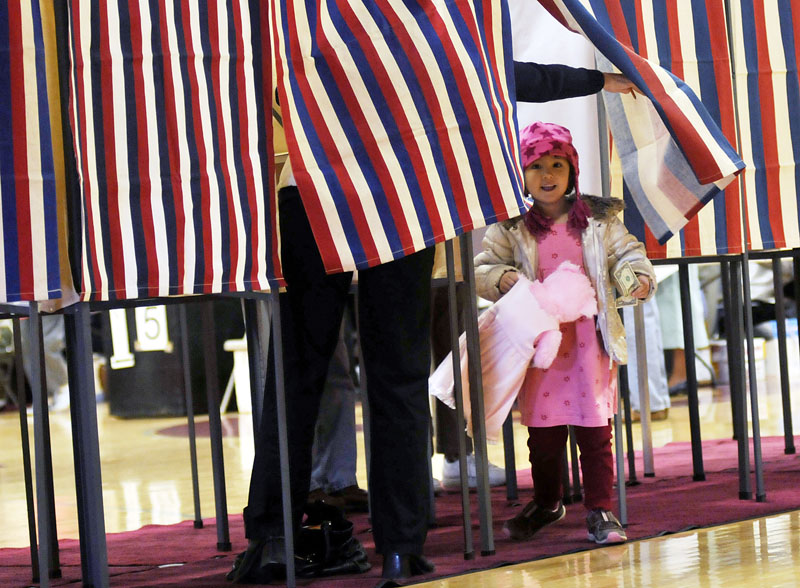State election officials were reporting few problems early today as Mainers began voting in an important, mid-term election.
“It seems to be a pretty steady turnout,” said Matthew Dunlap, Maine’s Secretary of State.
Dunlap had started his day in Old Town, and had stopped in Waterville on his way to Brunswick. He planned to arrive in Portland by noon, before heading north and winding up in Bangor.
Wardens were reporting isolated problems by midmorning at polling stations and had spoken to Dunlap’s office about them. Candidates trying to make one last pitch to voters who were trying to enter the polls was the most common issue reported. In Yarmouth, for instance, a candidate who was wearing a campaign button was told to remove it. In Old Town, a candidate’s friend was standing outside and talking up the candidate, which Dunlap said is not permitted.
This sort of behavior is the most common complaint he hears on election day, Dunlap said.
“Candidates are not supposed to impede voters,” he said.
Dunlap made his observations as residents across Maine began voting in a contentious, mid-term election to choose a new governor and decide whether to keep two members of Congress in office. Also on the ballot was a new proposal for a casino in Maine, and scores of legislative and local races. These and other issues are expected to bring a large number of voters to the polls, officials are predicting.
Voting began at 6 a.m. Tuesday at some polling stations. All must be open by 10 a.m.
Dunlap projected up to 55 percent of eligible voters on Tuesday will cast tallies, which is more than most elections. That includes more than 125,000 people who already voted via absentee ballot.
Across the country, Republicans expressed confidence as the midterm elections arrived. And it was no different in this blue state where polls showed Republican Paul LePage leading the race for governor and put a pair of Republicans within striking distance of Democratic Reps. Mike Michaud and Chellie Pingree.
Democrats, who now hold the governor’s office, both congressional seats and a majority in the state Legislature, were taking nothing for granted. Arden Manning, Democratic campaign manager, said getting their supporters out to vote was critical if Democrats were to win major offices Tuesday.
In the five-way governor’s race, LePage was battling independent Eliot Cutler and Democrat Libby Mitchell. Independents Shawn Moody and Kevin Scott trailed far behind.
Outside a Portland polling place, Justina McGettigan, a Portland prosecutor, said she followed the polls and not her heart by voting for Cutler, who been rising in polls.
“I was concerned that a vote for Libby Mitchell was a vote for Paul LePage,” said McGettigan.
She said LePage is too extreme and divisive and “appeals to people’s worst instincts.”
Dave Cote, a retired teacher who has seen his retirement savings plummet because of the economic downturn, said he voted for LePage because he thinks he’s the most fiscally responsible candidate.
He said LePage’s life story also appealed to him. Homeless at 11, LePage rose to become mayor of Waterville and general manager of the popular Marden’s chain of discount retail stores.
In the House, pre-election polls showed Republican Dean Scontras gaining ground on Pingree as she sought a second term in the 1st District. In the 2nd District, Republican Jason Levesque was hoping voter discontent with incumbents would propel him past Michaud, who’s seeking a fifth term.
Also on the statewide ballot was a referendum on a resort-casino in Oxford County, two bond issues totaling nearly $15 million and state House and Senate races.
Mainers have rejected three casino referendums since 2003, when voters opened the door to slot machines by approving a racetrack casino, Hollywood Slots in Bangor. But casino proponents felt that the sagging economy and the need for jobs might lead to success for the state’s first full-scale casino with table games.
While candidates pushed to get out the vote, Dunlap’s turnout forecast was comparable to other open-seat gubernatorial races but lighter than in presidential election years.
On the eve of the election, 128,817 absentee ballots had been returned, and more were expected to arrive Tuesday. As of Monday night, 48,595 ballots had been cast by Democrats and 44,619 by Republicans, while nearly 32,996 ballots were cast by voters who aren’t enrolled in either party.
Cutler’s campaign, hoping to get a boost from 11th-hour changes of heart, told voters who cast absentee ballots for someone else but now support his campaign that they could ask local officials for new ballots so they can vote again. But that is not possible if the ballots have already been processed.
Dunlap said the law on taking back ballots is somewhat vague, but election officials’ policy is that changing one’s mind does not qualify as sufficient reason for absentees to revote. However, any ballots that are reissued will be marked as challenged and the issue could be decided in court in the event of a recount, said Dunlap.
In Portland, two voters tried to rescind their ballots by late Monday afternoon, but neither was allowed to do so because their ballots had been processed, said Kathy Jones, elections administrator.
Copy the Story LinkSend questions/comments to the editors.



Success. Please wait for the page to reload. If the page does not reload within 5 seconds, please refresh the page.
Enter your email and password to access comments.
Hi, to comment on stories you must . This profile is in addition to your subscription and website login.
Already have a commenting profile? .
Invalid username/password.
Please check your email to confirm and complete your registration.
Only subscribers are eligible to post comments. Please subscribe or login first for digital access. Here’s why.
Use the form below to reset your password. When you've submitted your account email, we will send an email with a reset code.